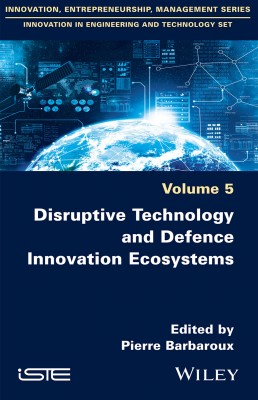
Recent advances in the disciplines of computer science (e.g., quantum theory, artificial intelligence), biotechnology and nanotechnology have deeply modified the structures of knowledge from which military capabilities are likely to develop. This book discusses the implications of disruptive technologies for the defence innovation ecosystem.
Two complementary dimensions of the defence innovation ecosystem are highlighted: the industrial and intra-organizational. On the industrial scale, there is a shift in the ecology of knowledge underpinning the defence industrial and technological base (DITB). At the intra-organizational level, it is the actors’ practices that change and, through them, their skills and the processes by which they are acquired and transferred. In this context, the sources and legitimacy of innovation are being transformed, in turn requiring sometimes radical adaptations on the part of the various actors, including companies, military services, research communities and governmental agencies, which make up the defence innovation ecosystem.
Part 1. Transformation of the Innovation Organization Model in the Defence Sector
1. Innovation Dynamics in Defence Industries, Jean Belin and Marianne Guille.
2. Evolution of the Aerospace and Defence Innovation Model: Intensifying Science and Technology Relationships, Cécile Fauconnet.
3. Identification of Defence Technological Knowledge Systems: A Tool for Duality Analysis, François-Xavier Meunier.
4. Defence Aerospace Firms: What Are the Technological Coherence of Their R&D?, Cécile Fauconnet, Didier Lebert, Célia Zyla
and Sylvain Moura.
5. Innovation and Legitimacy: The Case of Remotely Piloted Aircraft Systems, Pierre Barbaroux.
Part 2. Transformation of Skills and Uses Induced by Innovations
6. Man–machine Teaming: Towards a New Paradigm of Man–machine Collaboration?, Vincent Ferrari.
7. Perspectives and Ambitions of the Maintenance in Operational Condition Renovated at the Heart of the Armament Programs: Illustrations in the Terrestrial Environment, Nicolas Hué, Walter Arnaud and Christophe Grandemange.
8. Technological Change and Individual Competencies: The Influence of Glass-cockpit Aircraft on French Air Force Pilots Training and Skills,
Cyril Camachon and Pierre Barbaroux.
9. Towards the Advent of High-Altitude Pseudo-Satellites (HAPS), Bertrand Kirsch and Olivier Montagnier.
Pierre Barbaroux is a full-time professor at the Ecole de l’air, France, where he is co-director of the Aerospace Cyber Resilience Research Chair and program director of the Advanced Master in Aerospace Project Management. He is also Vice-President of Scientific Cooperation of the Research Network on Innovation